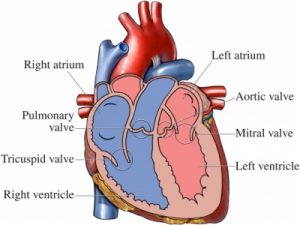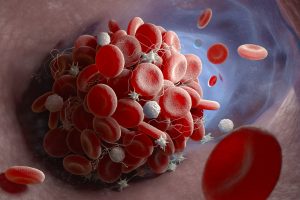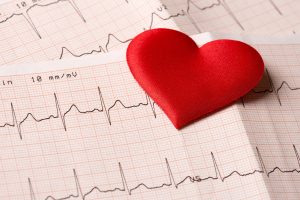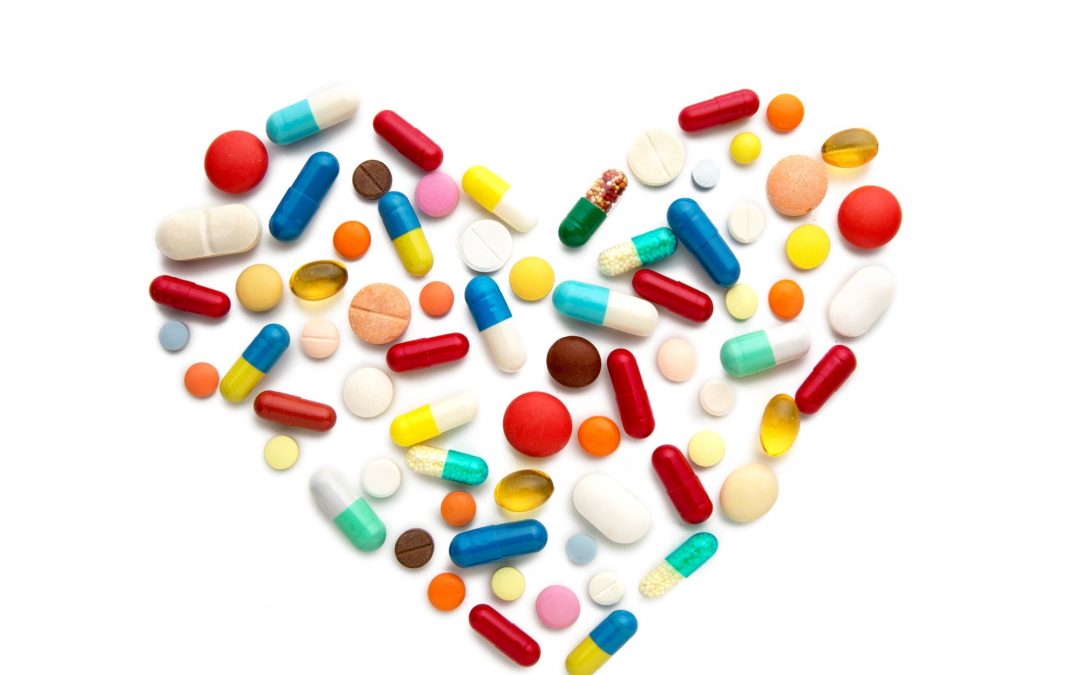About the Heart
In order to understand heart diseases, we first need to know a little more about the heart itself.
Your heart is a muscle the size of your fist, located between your lungs just left of the center of your chest.
It is divided into a left side and a right side. This means that the blood that is in the right side doesn’t mix with the blood on the left. This is important so that oxygen-rich blood and oxygen-poor blood don’t mix.

There are four chambers in your heart, and four valves. The valves open and close to regulate blood flow as it moves through the heart’s chambers, the blood vessels, and the lungs. The names of the valves are:
- Tricuspid
- Mitral
- Pulmonary
- Aortic
How the heart works:
- The right side of the heart gathers and pumps blood to the lungs through the pulmonary arteries
- The lungs give the blood fresh oxygen and get rid of carbon dioxide
- Blood (now rich with oxygen) enters the left side of the heart
- The left side pumps blood through the aorta to the rest of the body
- The body is supplied with oxygen and nutrients
Heart Diseases and Their Causes
Heart disease is any condition that negatively affects the heart. These can include conditions that affect the blood vessels, heart muscle, heart valves, or the rhythm of your heart beat. Heart diseases can lead to chest pain, heart attack, or stroke.
There isn’t just one heart disease, but many different types. These share many common causes and factors, but certain diseases have specific causes. Let’s explore each of the main types of heart disease and their causes.
Coronary Artery Disease (CAD)
 What it is: The most common type of heart disease, coronary artery disease is directly caused by blockages in the coronary arteries, which bring blood to your heart. The decreased blood flow and oxygen can cause chest pain (angina) or lead to heart attack.
What it is: The most common type of heart disease, coronary artery disease is directly caused by blockages in the coronary arteries, which bring blood to your heart. The decreased blood flow and oxygen can cause chest pain (angina) or lead to heart attack.
Causes:
- Atherosclerosis (hardened arteries because of plaque buildup)
- Age (increased age raises risk of heart disease—over 55 for men and after menopause for women)
- Inactivity
- Family history of CAD
- High blood pressure
- High levels of LDL (bad) cholesterol and/or low levels of HDL (good) cholesterol
- Obesity
- Smoking
- Stress
Congenital Heart Defects
What it is: These are defects that develop when the baby is in the womb. They can develop as the baby’s heart develops. These can be defects in the valves, the walls between the chambers, the heart muscle, or poor connections among blood vessels.
Causes:
- Some medical conditions
- Certain medications during pregnancy
- Alcohol or drug abuse during pregnancy
- Problems with genes or chromosomes in the child, such as Down syndrome
- Genetics
Arrhythmia
 What it is: Arrhythmias are irregular heart rhythms—too quickly, slowly, or with an abnormal pattern. This happens with the electrical impulses that regulate your heartbeats aren’t working properly.
What it is: Arrhythmias are irregular heart rhythms—too quickly, slowly, or with an abnormal pattern. This happens with the electrical impulses that regulate your heartbeats aren’t working properly.
Causes:
- Congenital heart defects
- CAD
- High blood pressure
- Diabetes
- Valvular heart disease
- Unmanaged stress
- Drug abuse
- Smoking
- Excessive alcohol intake
- Too much caffeine
- Some medications
Even a healthy individual can experience arrhythmias from a factor such as an electrical shock or the use of illegal drugs.
Valvular Heart Disease
What it is: A disease that affects one of the four heart valves. It usually causes heart palpitations, chest pain, fatigue, dizziness, fever, rapid weight gain, or fainting.
Causes:
- A person may be born with it
- The heart valve tissue degenerates with age
- Rheumatic fever
- Infections such as bacterial endocarditis
- Connective tissue disorders
- High blood pressure and atherosclerosis damage the aortic valve
- A medication called Methysergide, used to treat migraines
- Radiation therapy may lead to valvular hear disease
Heart Infection
 What it is: An infection in the heart muscle. Some examples include endocarditis, pericarditis, and myocarditis. Endocarditis is an infection of the inner lining of the heart valves. Pericarditis is an irritation of the pericardium, the sac-like membrane around your heart. Myocarditis is caused by a viral infection or autoimmune response, and damages the heart muscle.
What it is: An infection in the heart muscle. Some examples include endocarditis, pericarditis, and myocarditis. Endocarditis is an infection of the inner lining of the heart valves. Pericarditis is an irritation of the pericardium, the sac-like membrane around your heart. Myocarditis is caused by a viral infection or autoimmune response, and damages the heart muscle.
Causes:
- Bacteria
- Viruses
- Parasites
Cardiomyopathy
What it is: Cardiomyopathy is a thickened, enlarged, or stiff heart muscle. There are different types of cardiomyopathy, with different causes for each type:
Dilated cardiomyopathy is the most common, in which the left ventricle of the heart is enlarged or dilated.
Causes: reduced blood flow to the heart (ischemic heart disease) especially after a heart attack, infection, or certain drugs. It can also be inherited.
Hypertrophic cardiomyopathy is when the heart muscle is unusually thick.
Causes: This is usually inherited but can develop over time from high blood pressure or aging.
Restrictive cardiomyopathy is the least common type and occurs when the heart muscle becomes rigid.
Causes: unfortunately, this may occur for no apparent reason. It can also be caused by disease like connective tissue disorders. Buildups in your body—like iron buildup, buildup of abnormal proteins—or certain cancer treatments can also cause restrictive cardiomyopathy.
Pericardial Disease
What it is: The pericardium is the sac that surrounds your heart. When this is diseased or inflamed, it is called pericardial disease.
Causes:
- Viruses
- Inflammatory diseases (lupus, rheumatoid arthritis)
- Injury
- Open heart surgery
Common Risk Factors
Though each type of heart disease has its individual causes, these are common risk factors of heart disease:
- Advanced age
- Sex (men are usually at a greater risk; women’s risk rises after menopause)
- Family History
- Atherosclerosis (plaque buildup in the arteries / hardened arteries)
- High Blood pressure
- Smoking
- Lack of physical activity
- Unhealthy diet
- Obesity
- Unmanaged Stress
How to Lower Your Risk of Heart Disease
There are some factors and causes such as family history, birth defects, and aging that we have little control over. But others we can influence. Here are some things you can do to prevent heart disease:
- Eat a healthy diet, one rich in fruits, vegetables, and whole grains. This will help you avoid buildup of plaque in your arteries, diabetes, obesity, and high blood pressure.
- Manage cholesterol. Avoid foods with trans fat, hydrogenated fat, or that are processed or deep fried. Eat foods with healthy fats like fatty fish, vegetable oils, avocados, legumes, nuts, and seeds.
- Get regular physical activity. Thirty minutes a day can help you lower your blood pressure and avoid conditions like obesity and diabetes. It can also help you manage stress.
- Get your blood pressure checked regularly. Blood pressure has few outward symptoms, so the best way to see if you have high blood pressure is to get it checked.
- Quit smoking or tobacco use. This will help also you avoid buildup in your arteries and maintain a normal blood pressure.
- Limit alcohol intake. Excessive alcohol can lead to weight gain and high blood pressure.
- Cut down on salt. Salt also raises blood pressure, and decreasing salt lowers blood pressure.
- Include supplements such as l-arginine, l-citrulline, CoQ10, and beetroot powder in your daily routine. These work to relax and expand the blood vessels. This helps you avoid conditions such as high blood pressure and atherosclerosis. (Check out some great supplements here!)
- Manage stress. High stress can lead to high blood pressure. Include relaxing and enjoyable activities in your day, and get plenty of sleep and exercise.
- Get plenty of sleep. This will help your stress level, blood pressure, and overall well-being.
The Bottom Line
There are several types of heart disease and even more factors and causes. There are some causes we can’t change – like our age or genetics. But by living a healthy lifestyle, we can reduce our risk of heart disease. Talk with your doctor about what steps are best for you to keep your heart healthy.

